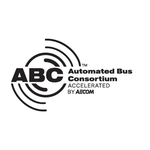The Consortium of U.S. transit and transportation agencies will accept proposals from potential vendors through May 23, 2022
DALLAS–(BUSINESS WIRE)–The Automated Bus Consortium™, a collective of U.S. transit agencies and departments of transportation, announced today the release of a request for proposals (RFP) to procure up to seventy full-size Level 4 automated buses. “Level 4” is a designation of highly automated vehicles as defined by the Society of Automotive Engineers (SAE). Level 4 buses operate in pre-determined environments and still have drivers, steering wheels, and pedals. These vehicles will be deployed in revenue service on pilot routes selected by each participating agency, resulting in significant advancements in understanding the impacts of automation.
The RFP represents the first-ever battery-electric automated bus procurement and large-scale deployment for full-sized buses, and was issued by the State of Michigan, which is serving as the lead procurement agency on behalf of the Consortium agencies. Formed by AECOM, the Automated Bus Consortium is a first-of-its-kind approach to investigate the feasibility of pilot automated bus projects and accelerate the deployment of automated transit technologies.
“The State of Michigan is excited to serve as the lead agency for this innovative procurement that reflects our commitment to advancing the application of technology in public transit,” said Jean Ruestman, administrator, Office of Passenger Transportation at Michigan Department of Transportation. “The lessons learned from the deployment of Level 4 automated buses on the pilot routes will help advance the industry.”
Participants in this program include founding member agencies Dallas Area Rapid Transit, Metropolitan Atlanta Rapid Transit Authority, Metropolitan Transit Authority of Harris County, MetroLINK, Michigan Department of Transportation/Office of Future Mobility and Electrification, Capital Area Transportation Authority, Michigan State University, and Huron Transit Corporation. They will be joined by new Consortium members NJ TRANSIT and RATP Dev.
The Automated Bus Consortium previously announced the completion of the country’s first automated bus specification, combining the American Public Transportation Association’s Standard Bus Procurement Guideline for standard bus specification with the new full-size bus Automated Driving System requirements developed by AECOM with input from the Consortium’s Bus Specification Committee.
“AECOM is incredibly excited that the Automated Bus Consortium has reached this significant milestone and congratulates its member agencies on the issuance of this RFP,” said Jennifer Aument, chief executive of AECOM’s global Transportation business. “This is a bold step in investigating the role of technology in improving the safety, reliability, and agility of public transit. We look forward to continuing our work with the Consortium throughout this procurement process and celebrating future achievements, including automated buses being deployed on selected pilot routes.”
By combining the purchasing power of multiple agencies across the U.S., the Automated Bus Consortium aims to accelerate the adoption of state-of-the-art, safety-focused automated features not yet available to the industry. These features are designed to assist the bus operator in maneuvering the vehicle safely and improve service reliability. With the release of the RFP, the Consortium intends to select vendors by summer 2022 and receive a bus prototype for testing and certification in late 2023.
To view the RFP, visit https://sigma.michigan.gov/webapp/PRDVSS2X1/AltSelfService. Transportation agencies or state departments of transportation that are interested in joining the Automated Bus Consortium should contact Daryl Taavola at daryl.taavola@aecom.com and view the Consortium’s website at https://www.automatedbusconsortium.com/.
About the Automated Bus Consortium
With rapid advancement of automated technologies and the urgent need to improve mobility options while safely and effectively mitigating congestion in cities across the United States, the Consortium’s collaborative effort to leverage its combined resources and launch its pilot deployment program of full-sized Level 4 automated battery-electric buses is groundbreaking. Using cost-efficient and standardized methodologies and assessment, the Consortium will lead the nation’s effort to deploy and evaluate automated bus technology. Learn more about the Consortium at https://www.automatedbusconsortium.com/.
Contacts
Media: Rachel Weiss, rachel.weiss@aecom.com











































